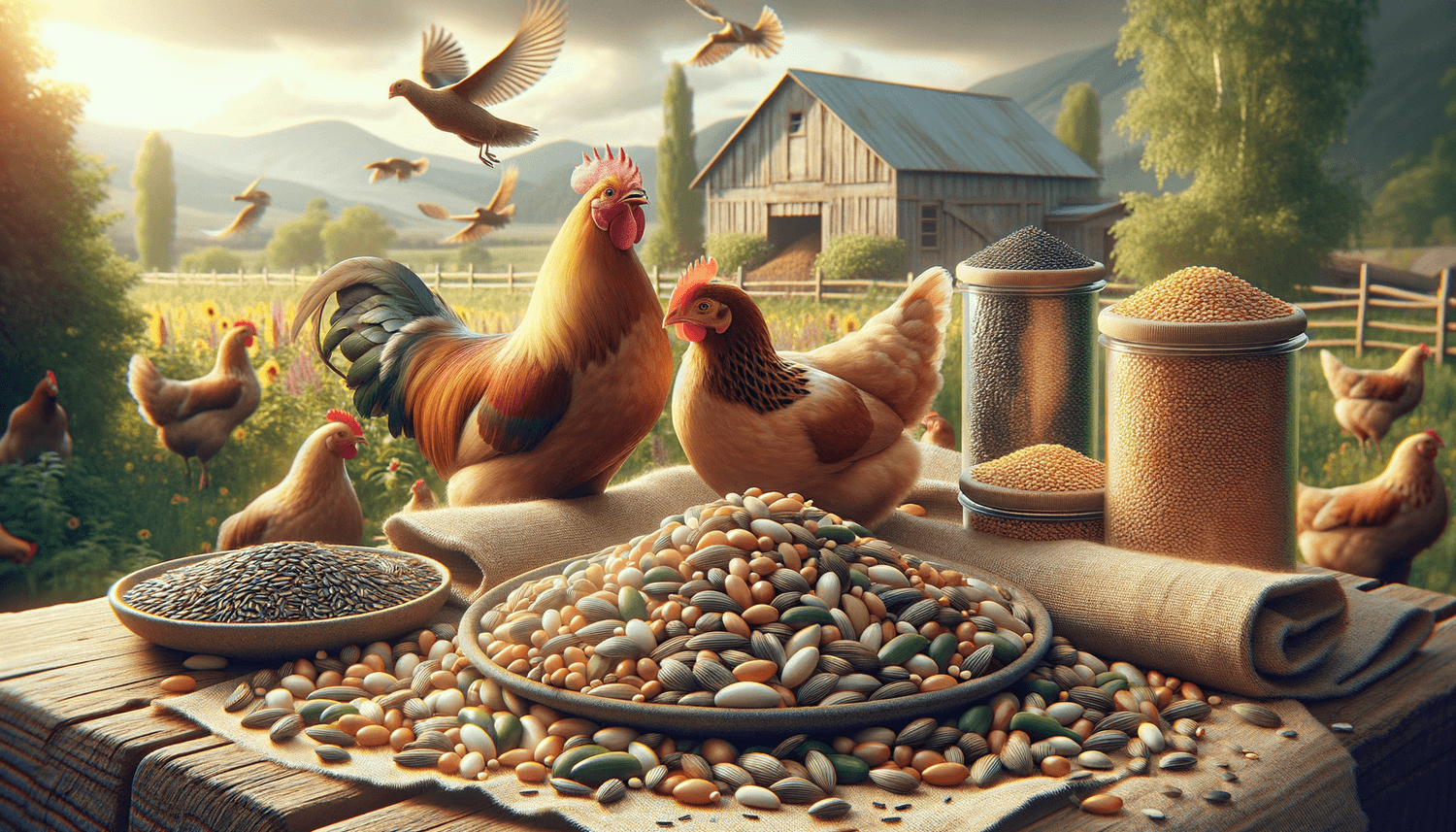Hey there, fellow chicken enthusiasts! Are you ready to embark on a cluckin’ good adventure? Today, we’re going to explore the tantalizing world of seeds and their place in our beloved backyard friends’ diet. Chickens are known for their diverse taste, which often leaves us wondering: Can they actually eat seeds? Well, buckle up, because we’re about to dive into the importance of a balanced diet, the benefits and potential risks of seeds, their nutritional value, and even how to whip up a tasty seed-based treat for your feathered pals! Let’s get crackin’!
Can chickens eat seeds?
Yes, chickens can safely eat seeds! In fact, seeds are a natural part of a chicken’s diet, providing essential nutrients like protein, healthy fats, and vitamins. However, it’s important to maintain a balanced diet and offer a variety of seeds in moderation to ensure your chickens remain healthy and happy.
A balanced diet: The key to healthy chickens
Just like us humans, chickens require a balanced diet to thrive and maintain overall health. To keep your backyard buddies at their best, it’s crucial to provide them with the right mix of nutrients. A chicken’s diet should primarily consist of a high-quality chicken feed, which ensures they have all the essential vitamins, minerals, and protein they need.
Chicken feed should account for around 80-90% of their overall diet. Aim for a well-formulated mix, available in various forms like pellets, crumbles, or mash. The remaining 10-20% of their diet can be filled with wholesome treats like fruits and vegetables. Offering a diverse range of foods within the recommended parameters will keep your chickens clucking contentedly and in tip-top shape.
Nutritional value of seeds for chickens.
Feeding seeds to chickens can offer them a delicious, nutrient-rich snack. A variety of seeds on the menu can supply them with essential vitamins, minerals, and other nutrients that contribute to good health. Keep in mind that different seeds possess distinct nutritional profiles, so offering a mix of seeds can be beneficial for your feathered friends.
Seeds like sunflower seeds, for instance, are packed with protein, healthy fats, and important trace minerals such as magnesium and selenium. Other seeds such as flaxseeds contain omega-3 fatty acids, which can help improve the quality of eggs laid by your chickens. Pumpkin seeds are known to be a good source of fiber and antioxidants and may even have natural antiparasitic properties. These are just a few examples of the nutritional value seeds can offer to chickens when served in moderation.
In addition to their nutrient content, seeds can also serve as a form of stimulation and enjoyment for your backyard flock. Foraging and pecking at seeds can help to reduce boredom, promoting their mental wellbeing, which ultimately spills over into their physical wellbeing. So, not only do seeds offer essential nutrients, they also contribute to the happiness and welfare of your chickens, making them a great addition to their treat repertoire.
Nutrition table of seeds for chickens.
| Information | Description |
|---|---|
| Nutritional Value | Seeds offer essential nutrients such as protein, vitamins, minerals, fiber, and healthy fats. |
| Suggested Serving Size | Seeds should be fed in moderation, accounting for a small portion of the 10-20% of treats in their diet.’ |
| Safe Feeding Practices | Ensure seeds are clean and untreated; offer a variety to ensure a balanced intake of nutrients. |
| Preparation | Seeds can be mixed with feed, scattered on the ground for foraging, or offered in a dedicated treat dispenser. |
| Potential Risks | Overconsumption of seeds can lead to an unbalanced diet and excess intake of certain nutrients or fats. |
| Hydration | Hydration needs are met primarily through water, while seeds contribute little to a chicken’s hydration. |
| Digestion | Seeds are generally easy to digest for chickens, but ensure that they are appropriate in size and not swallowed whole. |
| Seasonal Availability | Seeds are widely available throughout the year, making them an accessible treat for your flock. |
| Other Benefits | Seeds provide mental stimulation and enjoyment through foraging, contributing to overall well-being. |
Types of seeds your chickens will love
With countless seed options out there, it may be overwhelming to choose the right ones for your chickens. To get started, here are some popular seeds your backyard flock will enjoy:
- Sunflower seeds (shelled or whole)
- Pumpkin seeds
- Flaxseeds
- Millet
- Quinoa
- Chia seeds
- Sesame seeds
Remember to provide these seeds in moderation as a part of their overall diet. You can experiment with different mixtures of seeds to see which your chickens prefer.
Seeds to avoid
Although many seeds are safe for chickens, there are a few that should be avoided:
- Apple seeds (contain trace amounts of cyanide)
- Raw dried beans (contain a harmful toxin called lectin)
Also, avoid feeding chickens seeds that have been treated with chemicals or pesticides. Always opt for untreated seeds to ensure safety.
When to feed seeds to your chickens
It’s best to feed seeds to your chickens as a treat or supplement to their primary diet of high-quality chicken feed. Offer seeds in the late afternoon or early evening, after your chickens have had ample opportunity to consume their main feed. This way, you’ll have happy, well-nourished chickens who look forward to their scrumptious treats.
In the end, seeds can be a wonderful addition to your chicken’s diet, offering not only a variety of essential nutrients but also enhancing their happiness and reducing boredom. As long as seeds are fed in moderation and accompanied by a balanced diet, your backyard flock will continue to thrive, cluck, and lay delicious eggs for you to enjoy!

















